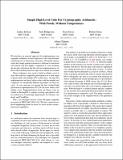Simple High-Level Code For Cryptographic Arithmetic With Proofs, Without Compromises
Author(s)
Erbsen, Andres; Philipoom, Jade D.; Gross, Jason S.; Sloan, Robert Hal; Chlipala, Adam
DownloadAccepted version (161.7Kb)
Open Access Policy
Open Access Policy
Creative Commons Attribution-Noncommercial-Share Alike
Terms of use
Metadata
Show full item recordAbstract
We introduce an unusual approach for implementing cryptographic arithmetic in short high-level code with machinechecked proofs of functional correctness. We further demonstrate that simple partial evaluation is sufficient to transform such initial code into highly competitive C code, breaking the decades-old pattern that the only fast implementations are those whose instruction-level steps were written out by hand. These techniques were used to build an elliptic-curve library that achieves competitive performance for a wide range of prime fields and multiple CPU architectures, showing that implementation and proof effort scales with the number and complexity of conceptually different algorithms, not their use cases. As one outcome, we present the first verified highperformance implementation of P-256, the most widely used elliptic curve. Implementations from our library were included in BoringSSL to replace existing specialized code, for inclusion in several large deployments for Chrome, Android, and CloudFlare. This is an abridged version of the full paper originally presented in IEEE S&P 2019 [10]. We have omitted most proof-engineering details in favor of a focus on the system's functional capabilities.
Date issued
2020-07Department
Massachusetts Institute of Technology. Computer Science and Artificial Intelligence Laboratory; Massachusetts Institute of Technology. Department of Electrical Engineering and Computer ScienceJournal
ACM SIGOPS Operating Systems Review
Publisher
Association for Computing Machinery (ACM)
Citation
Erbsen, Andres et al. "Simple High-Level Code For Cryptographic Arithmetic With Proofs, Without Compromises." ACM SIGOPS Operating Systems Review 54, 1 (July 2020): 23-30. © 2020 Author(s).
Version: Author's final manuscript
ISSN
0163-5980